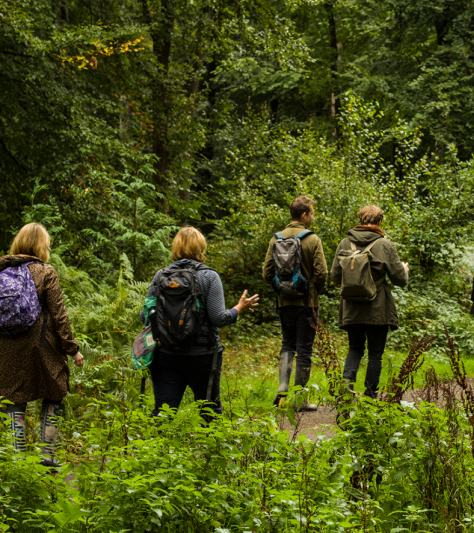RFS Gold Medal
The Royal Forestry Society's Gold Medal is the highest honour that can be awarded by the RFS for services to forestry.
RFS Gold Medals
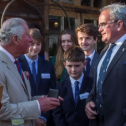
2019
Geraint Richards, Head Forester for the Duchy of Cornwall, has been presented with the Royal Forestry Society (RFS) Gold Medal for distinguished services to forestry by His Royal Highness The Duke of Cornwall.
Receiving the award, Geraint said: “The RFS was the first forestry organisation that I became a member of when, as a teenager, I decided to pursue a career as a forester. Ever since then the RFS has played an incredibly important part in my career, teaching me so much through its people, events and publications... As I consider the previous recipients of the RFS’ Gold Medal I can scarcely believe that my name can be added to such a distinguished list; many of my forestry heroes are included there and it means more to me than you can imagine to join their ranks.”
Peter Leathar (Herefordshire Division) & Simon Tame (South Western Division) said: “Geraint works tirelessly to promote good practice in Silviculture to deliver the wide range of potential benefits trees and woodlands have to offer individuals, communities and the nation. He is well deserving of this award.”
Geraint studied Forestry at Bangor University and worked for four years for the Forestry Commission in Kent and East Sussex as a forest officer before being appointed to his current post in 1996. As Head Forester, he is responsible for the management of over 2000ha (5000acres) of trees, woodlands and forests across the Duchy’s extensive land-holding in the South-West of England and Herefordshire.
Geraint is also Chair of Cornwall Woodmeet, organiser of the Royal Cornwall Show Forestry Section and on the committees of the Cornwall Red Squirrel Project and the Forestry Commission’s South-West Forestry and Woodland Advisory Committee. Nationally, Geraint is a trustee of Woodland Heritage and the British Horse-Loggers Charitable Trust, on the CLA’s Forestry and Woodland Committee, on the committees of the UK Squirrel Accord and the Plant Health and Biosecurity Alliance; he chairs Action Oak and until recently co-chaired Future Trees Trust and the National Tree Improvement Strategy and also the group focussing on developing forestry apprenticeships in England. Internationally, Geraint works with forestry institutes in Australia, Canada and New Zealand and sits on the Board of Directors of the Canadian Institute of Forestry.
Geraint was made a Member of the Royal Victorian Order (MVO) in the 2017 Birthday Honours for services to the Duchy of Cornwall.
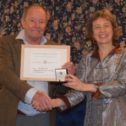
2017
Ted Green MBE
Ted Green is one of the country’s leading authorities on Ancient Trees, woodland fungi, forest soils and associated micro-organisms.
He is credited with doing much to bridge any gaps between forestry and conservation and has influenced the debate in forestry and arboriculture for more than 50 years.
Over his long career, Ted has put forward theories on the importance of managing the whole ecosystem. He was founder of the Ancient Tree Forum in 1993 and is a MBE.
In proposing Ted for the award, Derick Stickler, Chairman RFS Southern Division, described him as " a good ambassador for our multi-faceted profession."
And added: "He speaks with passion and enthusiasm, and presents his audience with ideas that are often treated with scepticism at first, but which are now part of mainstream debate in forestry and arboriculture circles."
Ted had met and admired foresters as a young boy but his professional life began when he was employed as a laboratory technician at Silwood Park, a part of Imperial College. There he had access to the ancient woodlands on the nearby Windsor Estate where he could pursue his interest in conservation, accumulating vast knowledge by observation, experiment and plant trialling.
Following employment at Silwood Park and English Nature, Ted became Conservation Adviser at Windsor in 1985.
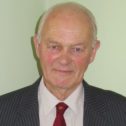
2012
J Bede Howell
A toddler's life in Barnes brought Kew Gardens within frequent reach. Later, years in Harrogate, at school in North Staffordshire and in Bewdley were close to trees.
Catholic schooling instilled familiarity with Latin and Greek, then after National Service in the ranks of the Worcestershire Regiment, Technical Colleges produced the qualifications needed for forestry under Professor Steven at Aberdeen.
"Sharp end" forestry occupied student vacations, also time in Normandy, before assisting Major Pilling in his forestry and arboricultural consultancy -- later becoming Abbey Forestry.
Working at forestry advice and on numerous committees led to the Society's Presidency and Gold Medal.
His Gold Medal was presented by the RFS President Nick Halsey, who said: “Bede Howell has been a towering figure in the forestry world for many decades. For those of us new to the industry in the 1960s and 1970s Bede’s name was synonymous with encouragement and sound advice on how to manage woods sustainably and profitably. This has continued throughout the careers of many foresters. At any meeting one attends, to see Bede’s cheerful countenance is a sure sign not only that common sense will prevail, but so will controversy and good debate!”
For Bede, one of the biggest challenges facing today’s woodland managers and planners remains the devastation caused by grey squirrel. He says: “I continue to be astonished by the money being spent planting trees and woodlands which, because of the grey squirrel, will never be able to reach timber quality. The grey squirrel is worse than the politicians, because there is no way at the moment of eliminating them. Politicians at least can be voted out of office!”
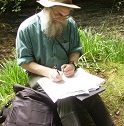
2011
Dr Keith Kirby
Keith Kirby was born behind a pub called the Woodman, so a forestry career was inevitable. A degree in Agricultural and Forest Sciences in Oxford was followed by a D.Phil study of brambles. Brief contract jobs in the Lake District led to a 33 year career as forestry and woodland officer with NCC and its successors, most recently Natural England. Since 2012 he has been a visiting researcher in the Department of Plant Sciences in Oxford, focussing particularly on the changes in woodland flora, but dabbling and writing on broader issues such as rewilding and woodland history.
Presenting the award, RFS President Nick Halsey said: “Dr Kirby has always recognised the need for woods to make money if they are to survive. He has been a consistent builder of bridges between the conservation and commercial interests of forestry management. As a result, we think he has made an enormous contribution towards promoting a mutual understanding of these problems, and this has been considerably to the advantage of woodland managers.”
Receiving the Gold Medal, Dr Kirby said: “It is an honour to receive this medal, really for being lucky enough to have had a career in forestry. It is great that the conservation and commercial sectors have come so much closer over the past 30 years and I am grateful for the support in this from staff in the Forestry Commission in particular.
“Trees and woods have never been more important to our future; we need more of them, and to look after those we have. If I have been a builder of bridges, it has worked because there has been someone else building on the other side to meet in the middle!”
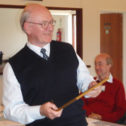
2010
Peter Goodwin
Peter Goodwin – one of the UK’s leading hardwood furniture makers, and a key figure in raising awareness of Acute Oak Decline (AOD) – has been presented with the Royal Forestry Society’s most prestigious award, the RFS Gold Medal for Distinguished Services to Forestry.
Peter has also been a driving force in the Royal Forestry Society’s (RFS) thriving East Anglia Division, is a co-founder of Woodland Heritage, and has been a part of the British and Irish Hardwoods Improvement Programme (BIHIP) and of the European Squirrel Initiative.
He joins an elite list of other forestry ‘greats’. Just 15 other Gold Medals have been awarded in the last 25 years – most recently to researcher and author Dr Peter Savill in 2006 and, in 2009, to Major David Davenport a central figure in many rural and forestry initiatives.
Presenting the award at an RFS meeting at Abbots Ripton Estate, Huntingdon, RFS Past President, John Besent, said: “For Peter, forestry is about the entire woodland chain from seed to cabinet making. Every part of the process is important and warrants the very best management if the UK is to continue to excel in producing quality furniture from sustainable home grown timber.
“Peter’s company, Titchmarsh & Goodwin, are leading producers of quality furniture from quality trees and Peter has been, and is, an excellent ambassador for the UK forestry and furniture industry. But Peter’s contribution to forestry does not end there.
“Peter is passionate about passing on his knowledge and expertise to the foresters and furniture makers of the future, and about maintaining the health of Britain’s woods for future generations. Peter is not one for sitting back and letting others do the work; he wants to make a difference for the better through his own initiatives and actions.”
The roots of Peter’s business, Titchmarsh & Goodwin, based in Back Hamlet, Ipswich, can be traced to around 1770, when Samuel Goodwin, a carpenter of Woodbridge, Suffolk, sent his son George to join the workshops of a London cabinetmaker.
Peter, who is Suffolk born and bred, joined the company business more than 190 years later – in 1961! He said: “I am utterly humbled to have joined such an elite group of Gold Medal holders. I have always thought of myself as a loud-mouthed foot soldier trying to help foresters, and I never dreamt I would be considered amongst those heroes of mine who hold the Gold Medal!”
He will, he says, keep up pressure on Defra, the Forestry Commission and others to tackle the challenges of AOD and Oak Processionary Moth.
He added: “I will be utterly relentless. If we do not tackle these challenges we will see a massive decline in the quality of timber sent to furniture and joinery businesses. I thank the RFS, its members and many others for their support for the Woodland Heritage AOD Appeal to fund research into the causes of, and would urge everyone to contribute so that we can find a way to save our most iconic of British trees.”
As he celebrates 50 years working in the company, Peter says it is the smell of the industry that gives him the greatest motivation: “When I go into the workshops I can smell the polish and the waxes, they are traditional and very much part of our process. When I go into our sawmill, the smells take me instantly back into the woodland and the forest floor. Together they tell the whole story and they keep me inspired.”

2009
Major David Davenport CBE DL
Major David Davenport took over management of the woods on the family estate at Foxley, Herefordshire in 1967. The estate is 1900 ha of which 516 ha are woodland. The estate has been at the forefront of many practices to improve timber quality. He has always been a leading advocate of high pruning as a silvicultural practice integral to the production of quality timber and to this end has long been the UK agent for Silky Saws. He was founder and Chairman of the Poplar Working Group for Forest Research, and Foxley was a notable research site in the breeding and growing of poplar. Under David’s stewardship Foxley is regarded as an outstanding example of good forestry management. He has ensured the educational value of his woods has been widely shared with both foresters and the general public. David was Chairman of the Forestry Commission’s Regional Advisory Committee for the South West England Conservancy (1982-90), and President of the RFS from 1991 to 1992. He has actively supported RFS educational activities including organising the RFS overseas study tour to South Africa in 1992.

2006
Peter Savill BSc (Bangor), MSc (Bangor), PhD (Belfast), MA (Oxon), FICFor
Peter Savill started work as an Assistant Conservator of Forests in Sierra Leone in 1962. He joined the Northern Ireland Forest Service in 1966, and moved to Oxford University as a lecturer in Forestry in 1980 and Fellow of Linacre College. He retired as Reader in 2006. During his time in Oxford he supervised (sometimes jointly) 25 doctoral students and as director of the Oxford MSc course in forestry, over 400 MSc students. He has published 95 peer-reviewed papers, including nine books or book chapters.
2005
Cyril Hart
2001
J T McHardy
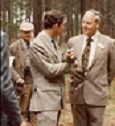
2000
E H M Harris MBE
Esmond was awarded the RFS Gold Medal in 2000 in recognition of his lifelong work championing education in forestry circles, in schools, with the public and for promoting wildlife conservation as an integral component of forest stewardship.
Esmond worked for the Forestry Commission for sixteen years until 1969, both as a field District Officer and in education at three FC schools, finishing as Principal at Gwydyr. He was then appointed as head of the Forestry Section in the new Forestry Industry Training Board before joining EFG as Forestry Director for the north of England. In 1975 he became Director of the RFS, where he remained until his retirement in 1989.
1999
Graham Tuley
1996
J A Spencer
1994
B N Howell
1993
J R Fletcher
1992
Prof J Matthews
1991
T H Owen
1984
P S Leathart
1981
Lord Dulverton
1979
J H B Workman
1976
A F Mitchell
1974
Earl of Bradford
Sir Richard Cotterell
Miles Hadfield
H Taylor
1973
H W D Pollock
1970
C J Venables
1967
Johnston Edwards
A L F Hills
N D G James
G Langshaw Rowland
Dr C Syrach-Larsen
1963
Sir Henry Bereford-Pierse
W R Day
A D C Le Sueur
Sir Eric Savill
1962
Maj J D D Evans
1961
C P Ackers
Lord Bolton
W E Hiley
Capt G C Wolrych-Whitmore

